What with the economy nosediving, an all-consuming construction scandal, massive budget overruns and by the seat of their pants venue delivery - to say nothing of virus-transmitting mosquitoes - it’s a wonder the Rio Olympics are happening at all
Photographs by Robb Williamson
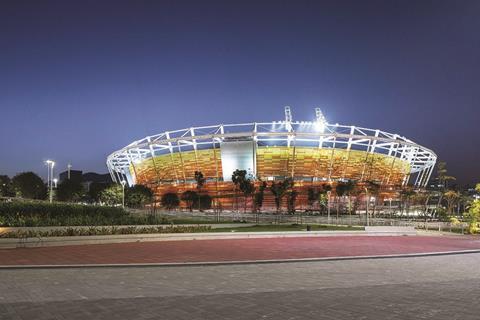

Rio de Janeiro will tonight host the opening ceremony of this summer’s Olympic Games following a £9bn construction programme that, somewhat against the odds, has just about been delivered in time. The last venue - the velodrome - was finished less than 30 days ago, while the metro line extension designed to take people from the beaches of Copacabana and Ipanema to the Games opened to a limited service this very week. Many international competitors - such as the Australian team - have complained that the athletes’ accommodation hasn’t actually been properly finished. If the city is mostly delivering the promises made when it bid to host the Games, it is doing it only by the skin of its teeth.
Even this, however, has only been achieved by the city paring down and reducing some of its original ambitions, as the tiger economy which won the bid to host the Games back in 2009 has turned tail and fled. Emil de Carvalho, executive director for Brazil at UK-based security consultant S-RM, describes the combination of economic shock from the collapse in the oil market, the political crisis around the impending impeachment of the president Dilma Rousseff, the Zika virus health scare and the country’s biggest ever corruption scandal, as a “perfect storm” of issues to hit the country. As if to underline the sense that the gods were against them, in April a freak wave caused the collapse of the £10m ocean-side cycle way built for the Games, killing two users, and bringing accusations of potentially negligent engineering. As Bill Hanway, executive vice president and global sports leader at Aecom, who as masterplanner of the Rio Olympic park has been working on the Rio Games since 2011, says: “Nothing has been easy during this entire process.” So, with all the chaos around it, has enough been salvaged to make this summer’s Olympics a success?
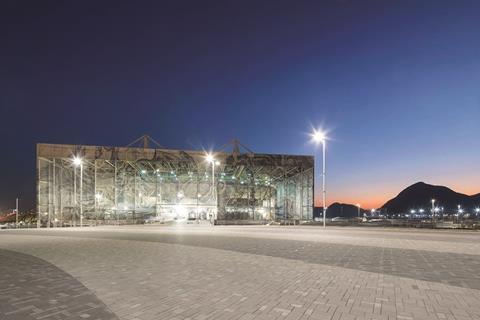
‘Things began to fall apart’
Brazil’s winning bid was centred around creating a 300-acre Olympic park which, not dissimilarly to London, was in a neglected part of the city - in this case the Barra de Tijuca district - with the Olympics to be used as a springboard for regeneration of the area. But from early on the bodies in charge of the preparations - which have been split between the Olympic Public Authority (APO), Rio City, Rio State and Brazil’s federal government - have faced questions about their progress delivering against that vision. In 2014, senior International Olympic Committee official John Coates described preparations as the worst he had ever experienced, saying the situation on the ground was “critical”. Former Davis Langdon sports head Jon Coxeter-Smith, who now runs sports-focused consultancy Sagacity and has previously worked in Brazil, says: “What the city wanted was clear at bid stage, but thereafter things began to fall apart. There was a lot of finger pointing, leadership changes and organisational changes.”
Recognising preparations were well behind the pace, Aecom, which had been brought on as masterplanner of the Barra Olympic park after its success in London, was given a much expanded role in 2013. Aecom’s Hanway says: “Compared to London it started two years late, so we had to design all the venues up to schematic design level before turning them over to design competitions, that way the whole process was accelerated.”
This slow start meant contractors were still not selected to provide a beach volleyball stadium, and temporary venues for rugby and mountain biking, as of May last year. S-RM’s de Carvalho says: “A lot of quite important tenders were left late, meaning that sometimes important firms declined or didn’t participate in the procurement because the situation wasn’t right.”
In part, according to Hanway and others, these delays were down to cultural issues. “In Brazil everything is negotiated, discussed, and pondered over and re-tested in a way that is very much part of the culture. In Rio there are very strict rules, but every decision takes a bit longer and it’s full of much more conversation.” Sagacity’s Coxeter-Smith agrees: “In Brazil there is a tendency sometimes to celebrate complexity rather than tackle it.”
In this challenging environment came a recession brought on by falling commodity and oil prices, in which Brazil’s construction companies were front and centre, because of the resulting retrenchment in oil and gas infrastructure investment. This has made life tough for a number of domestic firms on the Olympic project. Just two months ago the contract for the velodrome was cancelled and the work handed over to a subcontractor after the main contractor, Tecnosolo, filed for bankruptcy.
The velodrome has been the most challenged of the Olympic venues, but has been by no means the only one where construction has run up to the wire. By the turn of the year a number of venues were still way off completion, with the “youth arena” in the cluster of venues based in Deodoro only 80% finished, and the mammoth press and broadcast centre not completed either. Last week a spokesperson for Rio 2016 admitted to the Guardian that fewer than half of the 31 blocks of the athletes’ village had been properly tested, following complaints from teams of gas leaks and unsafe and unsanitary plumbing and wiring. The Australian team moved out to alternative accommodation in the city while the issues were resolved - they’ve since moved back - while the Dutch team hinted at suing to cover costs incurred sorting the problems.
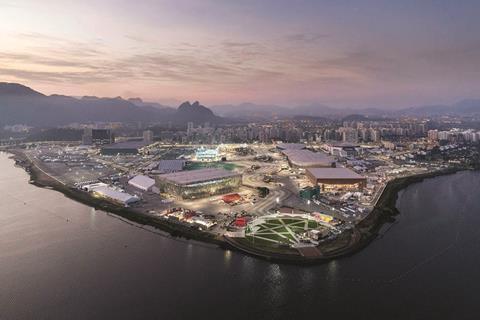
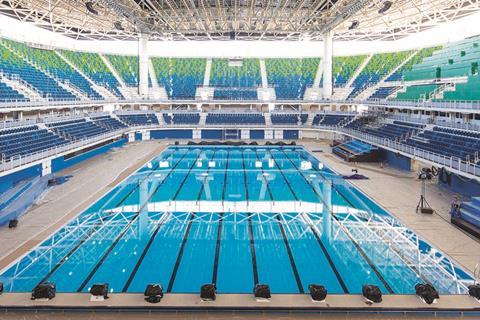
Opportunities missed
For Claudio Frischtak, a Rio-based infrastructure expert and founder of public-private partnership-consultant Inter.B, all this should be seen as relatively small beer next to some of the wider benefits the Olympic spend will bring to Rio residents. “This is not major,” he says. “Yes the Australians are upset but this is the finishing touches.
“Next to this you have to realise the huge advances made by the city government on the urban mobility side.” By this he means a series of infrastructure projects - including the delayed Metro 4 link opened this week to Games-related traffic only, two new bus rapid transit (BRT) routes and new highways - which, by hook or by crook, have been delivered just about in time. But even here, the city has given up on one project, the new TransBrasil BRT, designed to link Deodoro with Rio’s domestic airport in time for the Games, saying it will now not be completed until the middle of next year. In general, Frischtak says, while good progress has been made in the city of Rio, a wider opportunity has been missed. “This hasn’t been part of a plan that has tackled the transport problems of the wider metropolitan region,” he says. “This is a question for the legacy, and I think the authorities have to look wider.”
However, this omission is far less worrying, Frischtak says, than the failure to build the necessary infrastructure to tackle the pollution in the city’s Guanabara Bay, which will host sailing and swimming events. An investigation by the Associated Press last year found levels of pollution, including from untreated human sewage, thousands of times higher than would be allowed in the US. The study of 37 samples found competitors would have a 99% chance of falling ill from ingesting just three teaspoonfuls of the water. This is despite a bid promise made by Rio to clean up the lake, with the necessary huge investment in treatment facilities to clean the water running into the lake not forthcoming. Frischtak says: “This is a failure. They need a huge number of processing plants but the efforts have been very very inefficient. They are now designing a PPP to deal with it but it will be five to seven years before this will be cleaned up. Improvements so far have been perfunctory, it is sad.”
Of course financial pressure, exacerbated by the economic downturn, has made it much harder to find money for these additional projects - especially when the core job of building the stadiums and venues has been spiralling upwards. According to the APO, the full cost of the Games is now R$39.1bn, about £9bn, with costs rising as additional contractors have been brought in to work triple shifts to make up for delays. Of this, R$7.1bn (about £1.6bn) is the core cost of building the venues and park infrastructure, around half of which has been spent on the athletes’ village. A similar amount has been reserved for the actual staging of the Games itself with the rest, R$24.6bn, being spent on “legacy” projects such as surrounding infrastructure. Hanway says everything was done to re-engineer buildings in order to keep the cost down, citing the example of the aquatics centre, which was originally designed to have a floating roof, but which was redesigned with four columns in the corners - compromising some sight lines but hugely simplifying the engineering challenge.
According to an analysis by Oxford university and the Said Business School, the Rio Games has run 51% over its original budget - which while shocking to some, is exactly in line with the average Games overspend, according to its analysis. That spend has to be put in the context of the crisis in Brazil’s public finances, with severe cuts to vital public services that have led to delays in paying doctors and teachers. In June the governor of the wider Rio de Janeiro state (as opposed to the city), which is paying for the vital and delayed Metro extension, declared a financial “state of emergency” to stop it running out of cash entirely during the Olympics.
Acting state governor Francisco Dornelles said the state risked “the total collapse of public security, health care, education, urban mobility and environmental management,” without extra cash during the Games.
But it is not just the running of the Olympics itself that is being threatened by the financial crisis - the regeneration legacy of the Games is also dependent on a strong economy, without which it could become an embarrassing failure. Rio struck a deal with a consortium of developers - domestic construction giants Odebrecht and Andrade Gutierrez, with Carvalho Hosken - whereby the developers were given the freedom to redevelop the Barra Tijuca site after the Games on the basis they built the Olympic park for the Games first. Unsurprisingly there have been reports that post-Olympic apartment sales are well below expectations, with Reuters claiming just a quarter of the 1,000 sales expected by this stage have been achieved, raising fears over whether the redevelopment and regeneration
will be forthcoming at all. Hanway says the outcome at least will be better than if the park had remained in the hands of the cash-strapped state. “London was very fortunate to be coming very quickly out of that 2008 economic meltdown. I think Rio is going to be a slower, tougher transformation. I don’t think we’re going to see the economy recover quickly. I don’t know what the timing will be, but there’s no question that we’re in a challenged environment. If there’s a hope for the site, it remains around the PPP structure.”
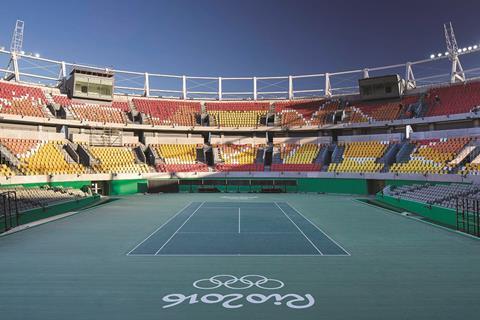
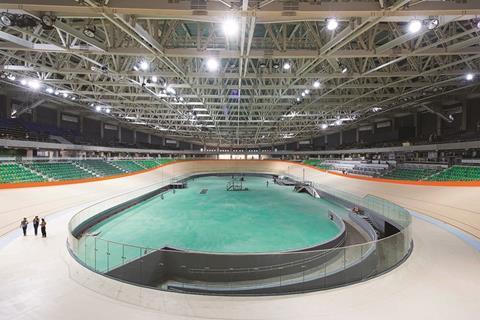
Construction scandal
In addition, inevitably, the construction effort cannot help but be somewhat overshadowed by the whiff of corruption in a country going through the biggest construction scandal in its history, known in Brazil universally as Lava Jato, or the Car Wash investigation. This has centred on lucrative infrastructure contracts from state oil firm Petrobras, and no corruption has so far been proved to have occurred on the Olympics. However, most of Brazil’s biggest construction firms have been involved in the scandal, and many are working on the Olympics. Take the Olympic park consortium: while Carvalho Hosken is not thought to be involved, Odebrecht boss Marcelo Odebrecht was sentenced to 19 years in prison in March for his part in the scandal, and Andrade Gutierrez is reported to have agreed a plea bargain with prosecutors after its chief executive, Otávio de Azevedo, was arrested.
Hanway says: “I’ve never seen any instance of corruption or have ever been asked a question that would be deemed to be inappropriate in the entire six years of working down there. We’re an international, publicly traded company, and everyone knows that there is absolutely no room for any possible indiscretion. The Olympics appears to have been isolated from that [scandal].”
Not everyone is so confident. Emil de Carvalho says: “There is clearly a risk of this behaviour in all public projects, and it’d be naive to think the Olympics would be immune from it.” Given the scale of the Car Wash scandal, officials are now, inevitably, looking into the conduct of the Olympics, with judges deciding in April to launch a parliamentary inquiry to investigate the awarding of any Olympic contracts to firms implicated already. In June federal police raided the offices of the consortium in charge of building the Deodoro Olympic cluster - consisting of OAS and Queiroz Galvao Construction - as part of a corruption probe.
Add to all these concerns the fears over the Zika virus and what it may do to visitor numbers (ticket sales have been very slow), plus worries that hosting the Games may make Brazil a target for terrorist attack, and it is easy to see why the usual Olympic buzz might be missing this time around. Overwhelmingly, the feeling among Brazilians is that the country was unwise to bid to host the World Cup and Olympic Games in such quick succession. “In hindsight,” says Frischtak, “I don’t think we should have bid for both. It was a foolish idea. The public sector’s capacity to carry out major projects is limited.”
And yet, he is one of many who says the Brazilian public will yet get behind these troubled Games. Certainly, there have been none of the protests which greeted the arrival of the World Cup to the country. “In Rio, I think maybe the public would still vote for having the Games. We have it, so let’s make the best out of it,” Frischtak says. Hanway too, has no regrets, and says the sheer beauty of the city will help it. “Between every building there’s a view of water or a beautiful mountain. Those spectators that come down to the Games will experience something special.
“It’s been enjoyable if not easy, but I’d happily do another project in Brazil. Even with all the challenges I’m still positive about all the benefits that the Olympics can bring.” With a fair wind, the country might just get away with it.
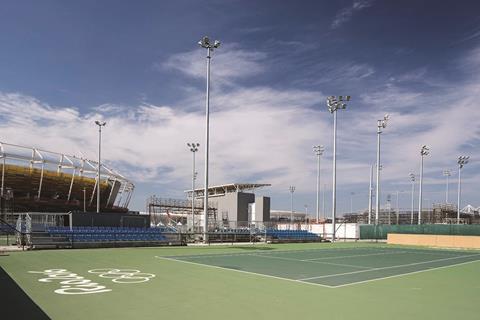
Rio 2016: Timeline
March 2014: The Federal Police of Brazil launched Operation Car Wash to investigate what has become the county’s biggest ever corruption scandal
April 2015: Zika virus health scare erupts
May 2015: Contractors were still not selected to provide a beach volleyball stadium and temporary venues for rugby and mountain biking
July 2015: Investigation by the Associated Press reveals olympic swimmers would have a 99% chance of falling ill from ingesting just three teaspoonfuls of water from the waterways in Rio de Janeiro
2015 - 2016: Economic shock from the collapse in the oil market
April 2016: A freak wave caused the collapse of the £10m ocean-side cycle way built for the Games, killing two users
May 2016: Contract for the velodrome was cancelled after the main contractor, Tecnosolo, filed for bankruptcy
May 2016: Political crisis around the impending impeachment of the president Dilma Rousseff
June 2016: The governor of the wider Rio de Janeiro state declared a financial “state of emergency” to stop it running out of cash entirely during the Olympics
June 2016: Federal policy raided the offices of the consortium, consisting of OAS and Queiroz Galvao Construction, in charge of building the Deodoro Olympic cluster as part of a corruption probe


























No comments yet